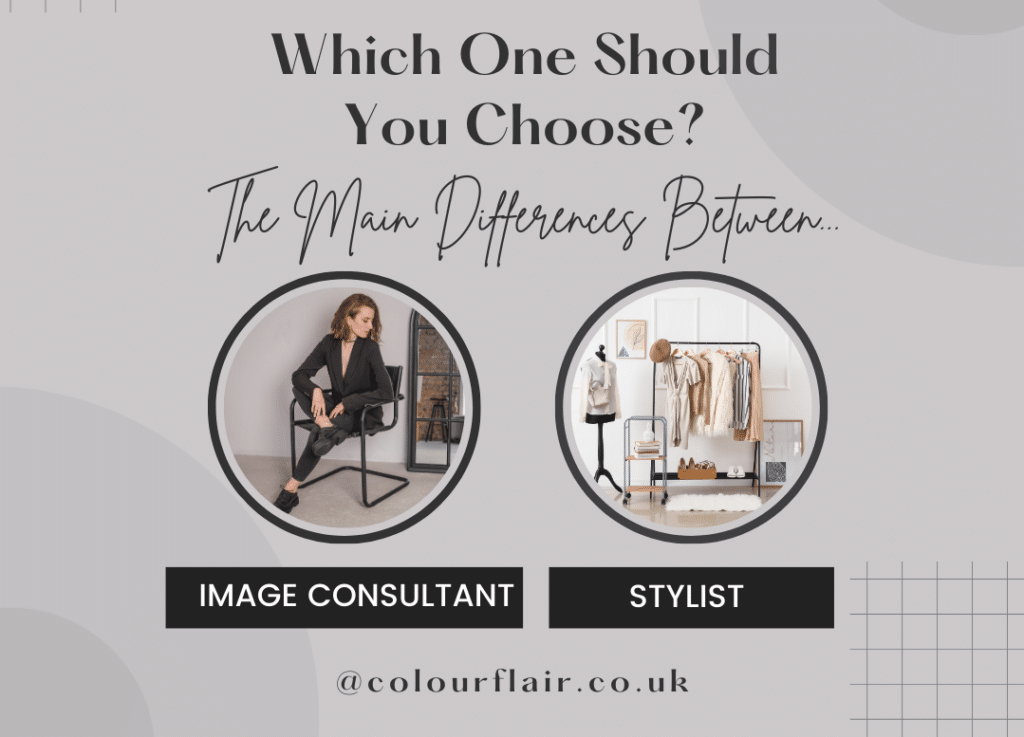There are hundreds of different roles and jobs within the style, fashion and image industry. So finding which of the many roles may be for you (and in which to make a career) can be a daunting task. Becoming an Image Consultant is just one of the many careers in the style and fashion world. So what is an Image Consultant – and is it different to a stylist?
Personal Stylist:
There are many categories of Stylist in the fashion industry. Stylists for clothes, hair and make-up, location as well as food and props stylists. What you generally see on the TV style programmes such as Gok Wan, is the work of a stylist. They produce a look for a specific event or reason. They work for magazines (editorial stylists) advertising agencies (commercial styling) and as costume or wardrobe co-ordinators, to name just a few of the sectors in which stylists work.
A Personal Stylist is also likely to be a personal shopper, and this can include not only clothes and fashion styles but also hair and make-up.
Image Consultant:
An Image Consultant by contrast can be both a personal stylist and a personal shopper. The main difference lies in the approach; an Image Consultant works with a client to help them in all areas of wardrobe planning to suit their clients’ lifestyle, personal style preferences as well as colour and other aspects of personal image. They work with the client as an individual with the aim of showing their clients how to ‘do it for themselves’.
Image Consultants offer a wide variety of services. Some may also include presentation skills or dining etiquette, as part of their services. But a well-trained Image Consultant will ideally want to start by analysing a clients’ colouring (Colour Analysis) because colour has a tremendous impact on how the client will ultimately look.
They also consider body shape and proportions, and will gain a thorough understanding of the clients clothing personality and lifestyle requirements of their wardrobe. Through this one-to-one approach, they show their clients what works for them and how to select from the shops only the things which make the client look their very best. Sometimes this involves high fashion – but does not have to, as the image consultants considers a clients’ individual style to be more important than dressing their client in the latest High Street fashion.
What Age Can you Become an Image Consultant?
While you can start in the fashion industry at any age, Image Consultants tend to have some life experience. A proportion of clients seeking the services of an image consultant will have issues that go beyond fashion and looking good. For instance, a client may have lost some confidence after the birth of a baby, may have put on weight – or lost weight or be facing other transitions such as divorce, illness or other.
Is There a Demand for these Services?
The services of personal shoppers, stylists and image professionals are very much in demand. Thanks in part to the many TV programmes and books – but also because it has never been more important to look your best in both your personal and in your business life.
Most Image Consultants run their own businesses, and rarely employ other staff, although some of the aspects of their business (bookkeeping, IT etc ) can be outsourced. Becoming an Image Consultant will not suit you if you need to be surrounded by lots of people on a regular basis.
It is, however, an extremely rewarding career – but like any small business, needs determination, endless enthusiasm and hard work to be successful. It beats the 9-5 job hands down, but it does need to be approached sensibly, and with realistic plans.
In Conclusion the Key Differences are
Scope:
- Stylists are focused mainly on clothing and fashion.
- Image Consultants cover a broader range of aspects related to a person’s image, including behavior and communication.
Services Provided:
- Stylists provide fashion-related services such as wardrobe planning and outfit selection.
- Image consultants provide a more holistic approach, addressing style, grooming, etiquette, body language, and communication.
Goals:
- The goal of a stylist is to create a visually appealing and fashionable look.
- The goal of an image consultant is to develop a cohesive and effective personal image that aligns with the client’s goals.
Client Needs:
- Clients seeking help with specific fashion needs or events typically hire stylists.
- Clients looking for a comprehensive overhaul of their personal or professional image usually seek out image consultants.
In summary, both professionals work to improve a person’s outward appearance. A stylist focuses primarily on fashion. An image consultant takes a more comprehensive approach to enhance overall personal presentation and communication.
If you are still interested in becoming an Image Consultant or Stylist after this short introduction – then you’ve come to the right place. The training to both careers starts with understanding a clients best colours and that starts with professional training in Colour Analysis. Find out more about our Diploma Course in Colour Analysis here.
Updated July 2024

